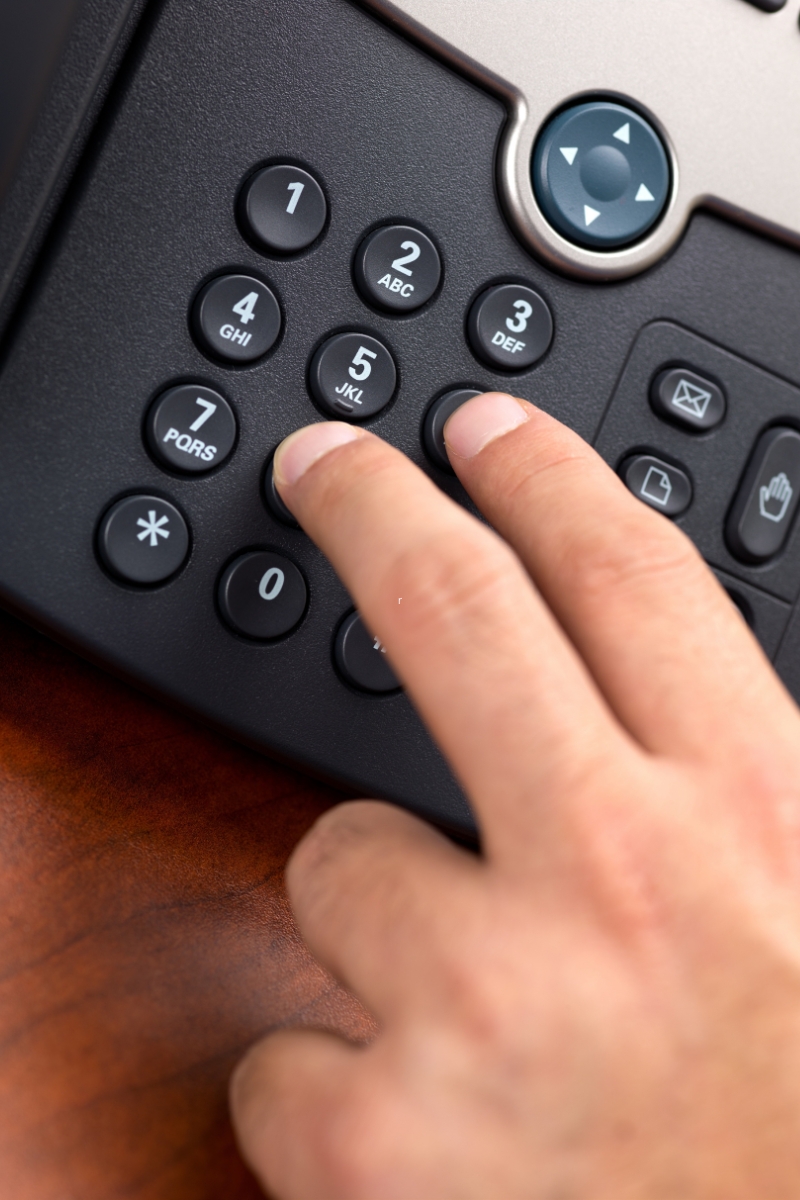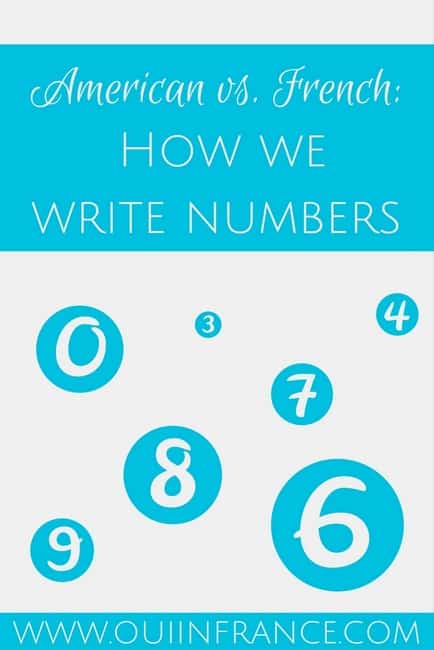There’s nothing that sends more shivers up French learners’ spines than dealing with French phone numbers. When I first moved to France, nothing sent me into a panic like having to write down a French phone number.
It was 10 times worse when I was on the phone and not face to face. Not only can French numbers be tricky in and of themselves, but when there are five pairs of them spoken to you when you aren’t used to it in rapid succession on the other end of the line, it’s enough to make you want to hang up the phone entirely and question your life choices. I kid. Kind of. But don’t despair!
Let’s learn about French phone numbers and how they’re structured so you can not only write them down with ease but also be confident in giving your phone number to others. You’ll be a pro in no time!
Soon after moving to France, you’ll notice how essential it is to be able to understand French numbers. It can be easy to get confused with the different formats and conventions. However, understanding the correct way to write a French phone number is important for both personal and professional communication.
You’ll need to give your number to secretaries when making appointments, making dinner reservations, and in so many other instances. It’s really important that you learn how to say and recognize French phone numbers (not to mention your own!) and that all starts with learning regular ol’ French numbers.
While most numbers are straightforward enough and you can learn 0-69 quickly, once you hit the number 70, your brain may need to recalibrate because you have to do some quick math. Even today, after a decade in France, I can honestly say that when I need to rattle off a number between 70-99, I take an extra second to make sure I’m saying the right number.
That’s because in French, the numbering gets a tiny bit complicated. The number 70 is soixante-dix, literally 60+10. I’m not talking about phone number digits yet, just explaining the numbering system. To say or write 70 in French, it is literally the numbers sixty and ten, so if you want to say you’re 70 years old you say, j’ai soixante-dix ans.
To further complicate things, 82 would be quatre-vingt-deux, literally 4*20+2. And even more fun, we have 99. That’s quatre-vingt-dix-neuf, literaly 4*20+10+9. My phone number of course has a 99 in it because, well, of course it does. ;-)))
P.S. Over in Belgium, they keep things simple and have a special word for for 70, which is septante and 90 is nonante. But they aren’t used in France.
Learning French is fun, right? OK, now that you have a little background and know your numbers up to 99, let’s get into some French phone number basics.
Understanding the format of French phone numbers: The basics
French phone numbers typically have ten digits and are written in pairs of two digits each with each pair separated by spaces or periods.
The country code for France is an additional two digits before the 10 main ones, +33, so take note of that when calling from abroad. But for calls within France, you don’t need the country code.
The first two-digit number pair indicates the geographic area, which can range from 01 to 05 for landlines, while mobile numbers start with 06 or 07. All numbers start with 0.
Non-geographic numbers, which are used for Voice over IP services and virtual numbers, start with 09.
Example: +33 09 12 34 56 78
In addition to the standard French phone numbers format, there are also variations in how they are written and recited. Some people may use hyphens instead of spaces or periods, while others may include the country code when giving their number to someone outside of France.
Regardless though, they’re always spoken and written as a single number of two digits and note stated one digit at a time. So a 45 is recited as forty-five (quarante-cinq) not four, five (quatre, cinq).
Something else to note is that when dialing a French number from abroad, that first 0 gets dropped for international calls. If you’re dialing from a landline in the United States, you’d first dial the 011 international access code that lets the operator connect to international circuits, then the country code and then the rest of the phone number but without that first 0), so 011 33 9 1… in my example above.
By understanding these different formats and conventions, you can ensure that your French phone number is written correctly and easily understood by others. But that’s easier said than done when you still don’t have a great handle on French, let alone all the number types and practice with all the two-digit numbers.
Format of French phone numbers
The French numbering system can be confusing for non-native speakers. The example I gave in the intro with numbers higher than 70 is part of it. But then the actual telephone number format takes it to another level.
Since 1996, French telephone numbers have been composed of 10 digits and are usually stated as a sequence of five double-digit numbers. For example, 09 22 53 84 07 would be pronounced as “zero neuf, vingt-deux, cinquante-trois, quatre-vingt-quatre, zero sept.”
The first two digits of a French phone number denote the geographic area (01-05 for land lines), mobile, or non-geographic number. The following table shows the area codes for the different regions in France:
| Area Code | Geographic Area |
|---|---|
| 01 | Île-de-France |
| 02 | Northwest France & Mayotte & La Reunion |
| 03 | Northeast France |
| 04 | Southeast France |
| 05 | Southwest France & Guadeloupe, Martinique & French Guiana |
06 and 07 prefixes aren’t geography specific. They just denote that they’re French mobile phone numbers. Three of most popular mobile phone plan service providers on the French market within metropolitan France are Bouygues Telecom (what Tom and I have always had), Orange, and SFR.
To dial a French phone number within France, just dial the 10-digit phone number starting with 0. Easy peasy. Dialing local phone numbers is a straightforward process.
One cool thing to note is that there are no long-distance charges for calling numbers within France from a French phone number. However, some customer service numbers may charge you a fee, so that would be the exception.
Now back to numbers being confusing for us French learners. The other issue is that if your ear isn’t used to hearing these number pairs — or giving them — you can trip yourself up. French phone numbers can be quite long and complex, with some numbers having implicit math within the name, as I explained.
For example, the number 87 is “quatre-vingt-sept,” which literally translates to “four twenty seven.” So if your phone number is 06 87 99 72 91, that’s quite a mouthful. Here’s what you would literally be saying each time you give your phone number:
zero-six, quatre-vingt-sept, quatre-vingt-dix-neuf, soixante-douze, quatre-vingt-onze.
YIKES! Luckily, a typical number wouldn’t have all high numbers.
And here lies the other major issue for French learners when it comes to French phone numbers. When you hear each pair, you might be tempted to write down the first thing you hear instead of waiting for the multiword number to be complete before moving onto the next pair. This was a huge problem for me!
What I mean is, you might hear soixante-douze which is 72 but you would recognize the numbers separately. So you’d quickly write down 60 (soixante) or 12 (douze) upon hearing it, not realizing the whole two-word number is actually 72.
That was SO stressful or me in the early days of living in France. I’d ask Tom to make phone calls and while it helped alleviate stress is the short term, it didn’t help me in the long term.
Phone numbers would make me want to run and hide. I was so relieved when I’d have to say or write a phone number with digits under 70.
Something else that would create problems was the 2-second pause I’d take while putting together the number in my mind. I’d think of what 87 was and it ended up being a split second too long for the person on the receiving end.
They’d think I was just saying quatre or just vingt, not realizing my brain needed an extra few seconds to successfully say 87 quickly so it would be understood as one pair of digits. And then I’d have to start again from the beginning because they thought I’d given them a 12-digit phone number…. which is obviously not correct.
Anyway, I won’t go own the rabbit hole of my French phone number woes too much. But I know if you’ve been there too, you feel me on this!
7 Things that I still don’t understand about life in France >>

Photo credit: Depositphotos.com/georgejmclittle
Special cases for French phone numbers
Non-geographic numbers
Non-geographic numbers in France are used for voice over IP services and shared-cost services. They start with the prefix 08/09 and are followed by 2 to 6 digits. 08 are generally customer service numbers.
The cost of calling these numbers varies depending on the service provider and the type of call. Freephone numbers, also known as “numéro vert,” are free to call from landlines and cell phone numbers.
French emergency phone numbers
In case of an emergency in France, it’s not 911! Commit 112 to memory instead and use it to reach the European emergency number. You’ll be routed appropriately even though 112 also works in every EU country.
Within France, dial 15 for medical emergencies, while 17 is used for police emergencies. The number 18 is used for fire emergencies. These numbers can be called for free from any phone, including mobile phones.
Common mistakes when writing French phone numbers
When writing and dialing French phone numbers, there are several common mistakes that people make. Here are a few to watch out for:
Including the initial 0 when dialing internationally and forgetting the country code.
One of the most common mistakes people make when dialing French phone numbers from abroad is including the initial 0. Scroll up to check out example from above. You need to leave the 0 out.
On the flip side, France’s country code is 33, so you’ll need to add +33 before the phone number. For example, if someone gives you a French phone number that starts with 06, you should write it as +336.
Mixing up the order of the numbers or confusing the numbers entirely
Those numbers come at you quickly and it’s only normal to ask people to speak slower or repeat themselves until you get it right. If you mix up the order of the numbers or get them wrong entirely, you could end up calling the wrong person or not being able to get through at all.
Tips for not losing your mind over French phone numbers
I remember how rough the early days were. French phone numbers can be a little confusing at first, but with a few tips and a bit of time and practice, it becomes easier.
Here are some helpful suggestions to keep in mind when trying to write down and give a French phone number:
-Remember that format. Regular French phone numbers have 10 digits. Listen for five pairs of numbers with a natural pause between each. Give your number to others this way as well.
What I mean is, be kind of quick if you’re going to rattle off a 99 and don’t pause awkwardly between quatre, vingt, dix or neuf. If you pause, it will lead to confusion because the person on the receiving end won’t know if you said 99 or 20 or 80 then 19. Say the 4-word number 99 with a quick confidence to avoid misunderstandings. How do I know this? Because as I said, my number contains a 99 and I’ve learned from doing it wrong enough times.
Keep in mind that each pair is said as one number and not two separate digits. So for example, if your French phone number has a 27 in it, don’t say two and seven separately. Give it as twenty-seven (vingt-sept).
-Don’t be afraid to ask someone to repeat themselves or to speak more slowly. There is absolutely no shame in asking someone either of these things. It’s better to get the number right than to save face.
Leave your ego at the door. When learning French, that’s my first tip. You will make mistakes and you should expect to. There’s no room for a big ego here.
-Use repetition and visualization to remember phone numbers. One way to remember French phone numbers is to repeat them several times and visualize the digits in your mind. Study French numbers up to 99 and even make flash cards so you can practice the ones that give you the most trouble.
-Always repeat the number back to the person after you write it down. What I like to do is as they say each digit, I’ll say it back to them as I write it down. I do this on the phone and in person.
That way, I know I’m getting it right and can slow down the flow of the numbers coming at me. I notice native French speakers do this as well, so it’s totally normal to do the same.
Let me explain what I mea. If you’re on the phone and someone is about to give you a phone number to note down and they start with 02, you repeat zéro-deux after them as you write it down, then they’ll continue with the next pair that you’ll repeat after they say it, and so on.
I also like repeating the full number back to them after. It’s good practice and double checks your work. I still do this today and sometimes still catch a few mistakes.
-Practice French phone numbers on your own time. I’d set up exercises for myself in the very early days where I’d practice writing down others’ numbers and giving my own phone number out.
My speaking partner is my husband Tom and for a few weeks, we’d have nightly phone number practice where he’d give me French phone numbers to write down and also have me practice giving mine.
We’d do this face to face and also with him on the phone out of sight. He’d be a normal guy in the beginning and then pretend he was a fast-talker, a mumbler, someone with no patience, someone who spoke quietly, etc. with phone numbers that had varying degrees of difficulty. It replicated real-life situations and it worked. Practice=progress.
***
I hope that you learned a bit about French phone numbers and understand how they work. Definitely take my tips into consideration and practice, practice, and practice some more so you can avoid any confusion when making calls in France.
What’s your experience been with French phone numbers?
PIN my understanding French phone numbers format post:










Oh Diane, your post is so timely! My husband’s French cell phone number…hoo boy, it sucks because it’s mostly 8s and 9s. I mean, honestly, who needs 85, 89, 93, or 99? Can we ignore those numbers? And whole decades of time that include those numbers? The horror! (I joke…sort of…) Just last night, I told my husband that when we get a cell phone for me, I request that I have a phone number without any 70s, 80s, or 90s, unless we move to French-speaking Switzerland first (with their more “human” 70s, 80s, 90s). He said we’re too poor for Switzerland! So, I gotta learn.
But seriously, your explanation of how you practiced with Tom is a gem (THANK YOU!!!!), and I’m going to ask my husband to do the same with me. Because boy, those numbers are no joke (I laugh as I write this)! Ugh, same issue when I have to give his birthdate at the hospital or doctor’s office…I sound like a complete moron as it takes me eons to think of those pesky French numbers…
Hi Johanna, so glad the post was helpful. The good news is it gets easier. Trust me in that. With some practice, you’ll be a pro in no time!
This takes me back to my school days as a teenager learning French and being totally baffled by the numbers! This was a really useful explainer of how it all works, and while I don’t personally have use for it, it’s great to actually finally get why the numbers in French are the way they are. Thanks for sharing!
You’re very welcome! Thanks for reading. 🙂
When you are writing numbers down as digits (1,2,3…8,9,10…), do you write 70, 71, 72, etc.? And 80 and 90? Or do you have to write, for example, 4 x 20+whatever…?
Hi Cyndy, you just write the number. So eighty (quatre vingt) is written 80.